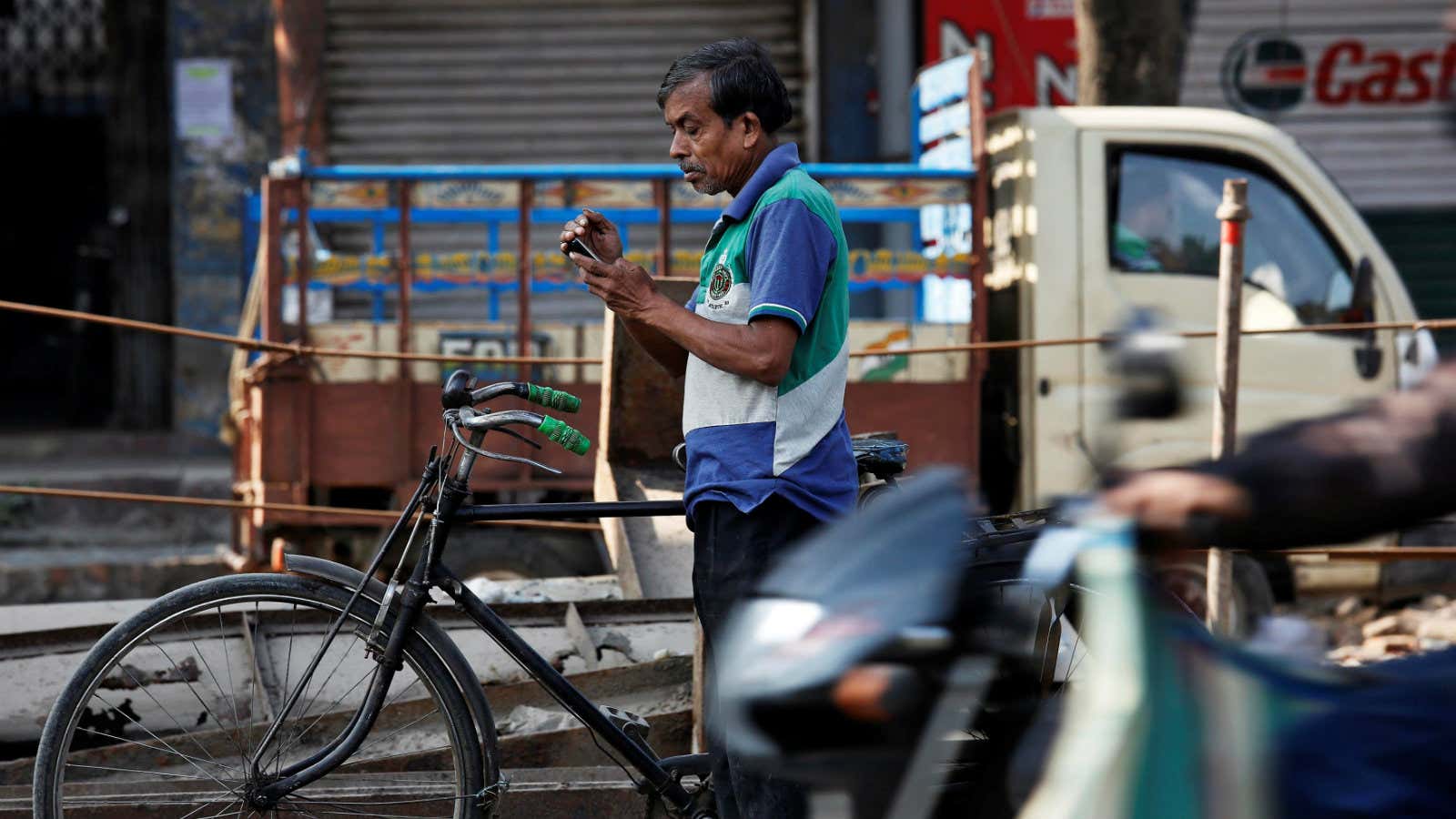With rumours spread on WhatsApp fuelling a spate of lynchings across India, the dark side of technology is becoming increasingly evident.
Even as they have transformed the lives of millions by improving access to information and services, the spread of smartphones and availability of cheap data are deepening social fissures in the country through a surfeit of fake news with deadly implications. And with more and more people spending hours on their phones, anxiety, loneliness, and dissatisfaction are all on the rise.
And now it’s time to acknowledge this inconvenient truth, argues a new book, Your Happiness Was Hacked, by Vivek Wadhwa and Alex Salkever.
Wadhwa, a distinguished fellow at Harvard Law School, and Salkever, a technologist, are hardly Luddites. The two have spent years working in and studying the tech industry in the US.
But their book explains how the services of giants such as Facebook and Google are addictive by design and shows what people can do to adopt a healthier, balanced approach to using these technologies.
“Our society needs to ensure that the benefits of technology use outweigh the downsides and that we allow technology into our lives only on our terms. Otherwise, we risk a dystopian future in which we are slaves to our devices; in which we allow the very things that make being human so meaningful to drown in the noise of a million dopamine signals arising from alerts, social-media posts, beeps, rings, and notifications,” they write.
The authors say India has more to worry about than the West. In an email interview with Quartz, they explained how Indians can reclaim their lives from tech, and why the government should follow the example of South Korea and recognise internet addiction as a public health concern.
Edited excerpts:
Your book argues that the dark side of technology is wreaking havoc on people’s lives in the West. How is this playing out in India?
With smartphones and internet access becoming inexpensive, almost every person will be soon connected, online, and addicted. The big difference between India and the West is the use of WhatsApp as the primary communications and social media platform.
As we have seen from the carnage that WhatsApp (has) caused and the need for the company to restrict its group sharing features, the technology has fatal design problems. Add to this the naïve first-time users and you have a brewing disaster—social engineering in ways that no one expected or understands. India has more, not less, to worry about than the West.
What is the positive side of technology in a country like India?
Giving everyone access to information helps lift people from poverty. Everyone can gain specialised knowledge and learn from everyone else. Tech has allowed India to build up a robust software industry. Families living far apart can chat or share videos. The poorest of the poor can receive access to telemedicine and medical care. And technology can help reduce corruption.

Given that technology has become one of the driving forces of India’s economy, how can Indians reclaim their lives from it?
Really, they should be thinking about the same things as everyone else. Specifically, they need to consider whether are they addicted to technology or using it in unhealthy ways. This is not as simple as it sounds because the context always matters. Some people may use WhatsApp to constantly chat even when they need to get work done. Others might use it periodically to call friends or people living far away. But we should always ask some simple questions like: Is the way I am using this app (or any technology) making me happy or unhappy? Is it hurting people around me emotionally? If I look back on my life, will I be glad I spent a lot of time on this app or would I rather have spent it another way?
How should the Indian government be thinking about balancing the advantages and disadvantages of technology?
The government surely has to develop strict regulations to protect privacy and the spread of misinformation and hatred, this is urgent. But it will need to go further as technology addiction increases. It needs to learn from countries that illustrate what its future could be.
South Korea, for example, considers internet addiction one of its most serious public health issues. The average South Korean high school student spends 23 hours a week playing online games. As of June 2007, South Korea had trained more than 1,000 counselors to treat internet and gaming addiction. The government has also signed up nearly 200 hospitals and treatment centres in the campaign. In China, current laws strongly discourage more than three hours of daily game use by children under the age of 18. Chinese internet game operators are mandated to install anti-addiction systems whereby the first three hours of play proceed normally, but the games themselves award points far more slowly for the next two hours, after which users receive in-game warnings like this: “You have entered unhealthy game time; please go offline immediately to rest. If you do not, your health will be damaged, and your points will be cut to zero.”
How do you think Indians should draw a balance when it comes to tech and information?
The problem here isn’t the user of technology, it is the design. For fake news, we can’t blame the public. WhatsApp itself has design defects; the features that Facebook added to it to make it addictive, like its own platform, were ill-conceived.
This is why India’s product designers need to create better products, which are suited to the culture and values of the country. They need to understand what went wrong in the Silicon Valley; the flawed techniques it used to create addiction. And then they need to make sure they don’t repeat these mistakes. We explain all this in the book in the hope that there will be a new generation of products that inform and uplift instead of addicting and harming
Even as India embraces technology, the fact remains that millions still don’t have access to it. What needs to change in Indians’ approach to and use of tech before the next billion comes online?
India should regulate technology so that the obvious problems of privacy, security, and addiction are corrected in the product design itself. It shouldn’t be like what happened with WhatsApp, where a badly designed product caused dozens of deaths and the government had to demand that the company fix its product. And then, users of the technology need to be educated in the best ways to use these technologies.
